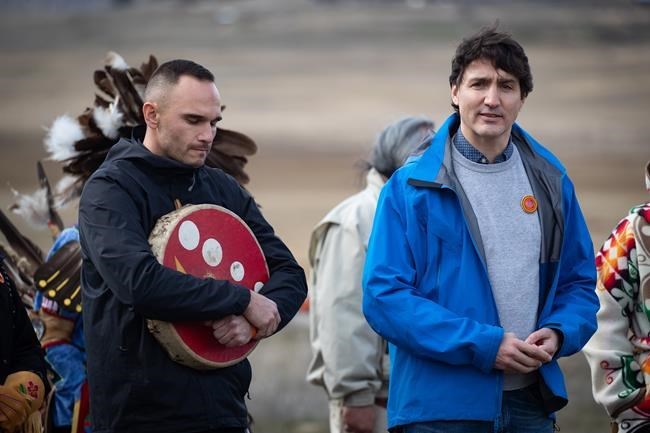WILLIAMS LAKE, B.C. ŌĆö The chief of the Williams Lake First Nation says he would support excavating possible unmarked graves at the site of the former St. Joseph's Mission residential school if that's what elders and the community decide is best.
But the decision is complex, involving dozens of other First Nations whose children also attended the institution, numerous landowners, potential DNA tests, multiple levels of government, the coroner and the RCMP.
All that is in addition to the anxiety Chief Willie Sellars said he has about ensuring there isn't more trauma for survivors if bodies are found.
"I really start stressing out when I start thinking about excavation," Sellars said in an interview.
"And we're going to get there, I would imagine, but it's not going to happen overnight."
The First Nation announced this week that 66 more "reflections," indicating possible graves, were found with radar and other methods during the second phase of its work around the site of the former Catholic-run school, 500 kilometres northeast of 91įŁ┤┤.
The nation announced in its first phase of searching last year that 93 potential graves were detected.
Chief Joe Alphonse, chair of the TsilhqotŌĆÖin National Government, which represents six TsilhqotŌĆÖin communities whose children attended St. JosephŌĆÖs Mission, said the nation would be open to having conversations about exhumation, but it could also issue a cease-and-desist order if it isn't properly involved.
Alphonse said their government wants more than just updates from the Williams Lake First Nation and should be "part of the planning and every aspect of doing any work" on the site.
Whitney Spearing, lead investigator on the project, said Wednesday during the announcement that there won't be confirmation that the "reflections" are human remains without excavation.
"It must be emphasized that no geophysical investigation can provide certainty into the presence of human remains," she said.
The nation has identified 48 First Nations whose children attended the institution while it was in operation between 1886 and 1981.
Sellars said they have started reaching out to have conversations about what's next.
"We're more than willing to sit down and discuss with any nation that is impacted and talk about next steps, and talk about inclusion, and talk about working together on these things," he said.
"But we haven't reached out and had that dialogue with all 48 of the communities that are impacted. We're getting there though."
Sellars said there is debate across the country about whether to leave remains in the ground or "bring them home."
"If you start talking about bringing kids home that are buried, then there's a topic of discussion around DNA and confirming where those kids came from," he said.
"And again, you just look at how complicated it gets. I really look forward to having those conversations with those communities, and having those conversations with the families that are impacted, moving forward into the future."
The discoveries at the Williams Lake site is one of several similar searches across the country since ground-penetrating radar located what are believed to be the remains of children at the site of the former residential school in Kamloops, B.C.
Sellars said the work that's been done at the St. Joseph's site is just "scratching the surface."
About 34 of the 782 hectares have so far been subjected to geophysical analysis.
More than six private landowners own parts of the properties, Sellars said.
He said the First Nation has a great relationship with the owners of the property searched in the first two phases and discussions have started on what Phase 3 could look like.
Sellars said a decision on exhuming possible remains will proceed carefully, so that it doesn't create more trauma.
"We're getting to a point right now where elders and survivors are starting to feel more comfortable about telling their story, because they're being empowered by the amount of support that we're seeing in our sacred fires, at our ceremonies, at our events," he said.
Alphonse said any protocols around exhuming would also have to take into consideration the beliefs of all First Nations involved.
"We're all First Nations, but we have our own spiritual beliefs and our own customs and protocols, and all of those things have to be honoured and respected," he said in an interview.
"The whole purpose of looking for these people is that they've been forgotten and now that's being addressed. But this is not just a Williams Lake First Nations issue."
Alphonse said Federal Minister of Crown-Indigenous Relations Marc Miller was "very disrespectful" when he tweeted support for the Williams Lake First Nation after the potential remains were announced without mentioning other First Nations.
"The other nations that had students go to that residential school, now they're being forgotten in this whole process. So, they're adding more trauma to the situation," he said.
Williams Lake First Nation is holding a sacred fire until Saturday, as a way of honouring those who attended the school. Sellars said multiple First Nations were represented at a drum circle as part of the ceremonies.
"It was very uplifting to just be there and be present and that's really what the focus is on right now," he said.
The final report of the Truth and Reconciliation Commission, which documented the experiences of those affected by Canada's residential school system, found at least 4,100 children died while attending the institutions.
The Indian Residential Schools Resolution Health Support Program has a hotline to help residential school survivors and their relatives suffering with trauma invoked by the recall of past abuse. The number is 1-866-925-4419.
ŌĆö By Ashley Joannou in 91įŁ┤┤
This report by The 91įŁ┤┤ Press was first published Jan. 27, 2023
The 91įŁ┤┤ Press



